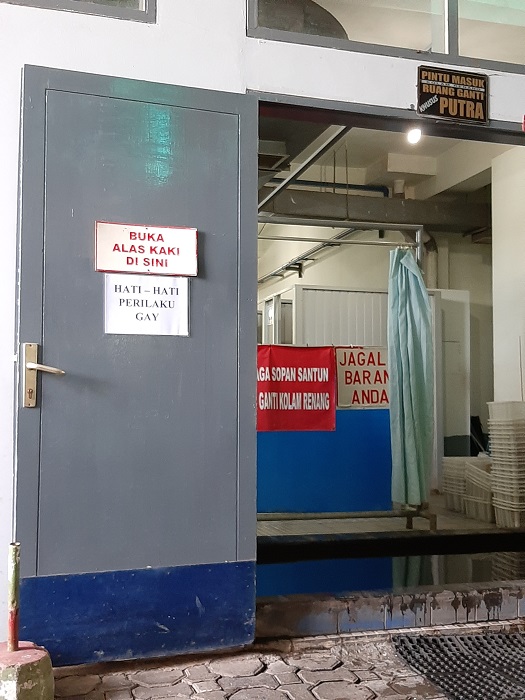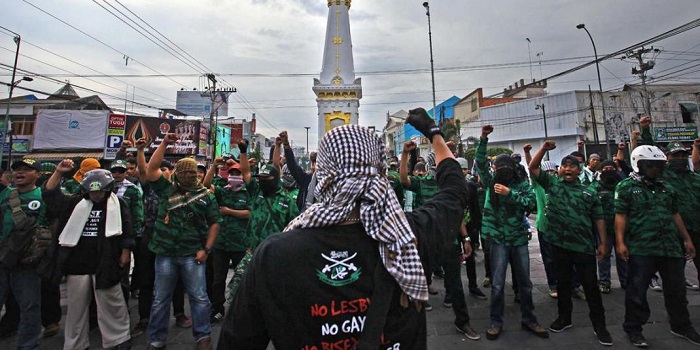Versi Bh. Indonesia
Made Diah Pitaloka Negara Puteri and Firdhan Aria Wijaya
It was just a casual lunch at a campus canteen until a conversation aroused our curiosity. Next to us, two young men were having a heated conversation about LGBT*.
The young man with sunglasses said to his friend, ‘I think LGBT people are dangerous. It’s sinful and I guess it’s some sort of disease. I’m afraid it’s contagious. Ever since we started seeing all the coverage of LGBT on the media, many of my friends have come out as gay. How disgusting! They shouldn’t have the right to express their identities, right?’
The friend replied in a calmer tone, ‘I feel pity for LGBT people. Some of them didn’t choose to be born that way. I see it as a disability but I kind of agree with your point. I think the government needs to consider segregation between normal people and LGBT.’
This snapshot of a conversation between two young educated men illustrates the climate of fear that is being generated against LGBT. By reflecting on their conversation, we explore the nexus of paranoia and hatred in Indonesia and how rising Islamic conservatism has triggered an internalisation of distrust and fear toward LGBT.
Framing LGBT as sinful
Since 2016, anti-LGBT narratives have provoked fear of LGBT throughout Indonesia. Islamic interpretations have been used to support this fear. For instance, the word ‘maksiat’, an Arabic word meaning serious offence, grave sin, guilt or wrongdoing, is frequently used to describe LGBT people.
Although Islamic scholars still debate if LGBT should be categorised as maksiat, mass media have not hesitated to publicise any association of LGBT with maksiat. For instance, the media gave air time to a lecturer at Pasundan University who stated that LGBT activities are maksiat. The media also gave air time to the mayor of Padang who said he wants to rid Padang of LGBT maksiat and to the vice district head of Garut who said that the government must ban LGBT because they are maksiat.

The use of maksiat creates a chasm between LGBT and other Indonesians. It frames LGBT as ‘not us’ and as jeopardising ‘who we are.’ Using maksiat to stigmatise, LGBT are presented as a monstrous enemy that must be fought and destroyed. In this fight, communities and organisations are encouraged to ban LGBT from social events. The power of maksiat shows the strength of Islamic morality in contemporary Indonesia.
Justifying LGBT punishment
By invoking Islam, many people in Indonesia believe that if someone is guilty of maksiat they must be punished. The word used to describe this punishment is ‘azab’, an Arabic word meaning affliction, distress, suffering, torment, torture.
Some Islamic scholars believe azab will be given in the afterlife while others argue it is given now. As such, some people believe that Indonesia is constantly being punished in the form of natural disasters for harbouring LGBT and that the only way to stop natural disasters is to remove all LGBT from Indonesia. For instance, the Islamic newspaper Republika reported that natural disasters are God’s way of punishing Indonesia for including LGBT.
Replacing fear with acceptance
According to Aan Anshori, coordinator of the East Java Muslim Anti-Discrimination Network, one way to reduce Indonesia’s climate of fear surrounding LGBT is to encourage acceptance of LGBT. Acceptance can be encouraged, says Anshori, through a proper understanding of religious stories.
One story often used to stigmatise LGBT is the story of Luth. In English, this is the story of Lot and the cities of Sodom and Gomorrah. Luth was said to be punished by God for homosexual behaviour. But Anshori says that it was not homosexuality that was being punished but sexual coercion. Anshori argues that in an ancient Arabic cultural context, sodomy was a form of sexual coercion used to degrade a person’s dignity. It was also a method of subjugation, particularly used to subjugate young men and boys. According to Anshori, it was sexual coercion and subjugation, not homosexual behaviour, that was deemed sinful by God and thus invoked punishment. For Anshori, this re-reading of the story of Luth can help Indonesia embrace its LGBT community.
Indonesia should acknowledge and honour LGBT as a part of its diversity, and it should stamp out the spreading of fear and hatred to ensure a tolerant society. How can we live the dream of ‘unity in diversity’ if we are not all valued members?
Made Diah Pitaloka Negara Puteri (made.diah.negara@gmail.com) is an independent researcher who focuses on gender, sexuality, ecofeminism and cultural studies. Firdhan Aria Wijaya (firdhanariawijaya@gmail.com) is an independent researcher who focuses on the intersections between queer theory and ecology. He is currently engaged in the initiative Panggung Minoritas in Bandung.
* The term ‘LGBT’ is used as a noun in Indonesian, and in this article, to mean the communities, the identity and/or the broader topic itself.
